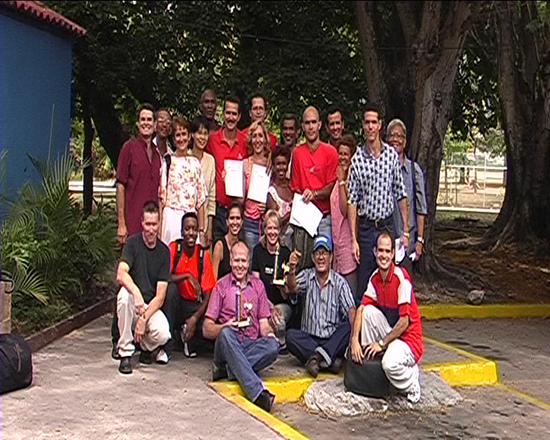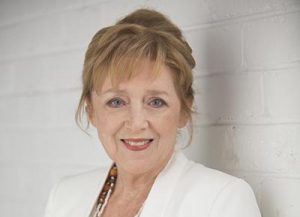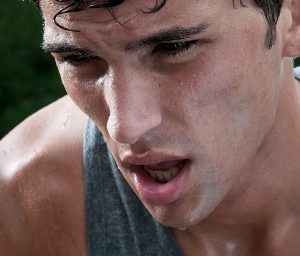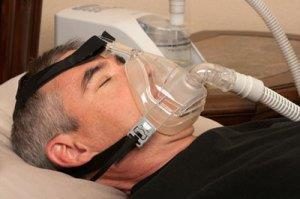
Buteyko project in Havana, Cuba
Report on 5 week work project in Havana, Cuba
Conducted at Finley Institute (17-24 January 2004) and Celia Sanchez Special School (17 May – 12 June 2004)
Program Objective
To introduce the Buteyko Institute Method of breathing retraining, based on the work of Professor Konstantin Buteyko, to the Republic of Cuba with the aim of:
- improving the health and well-being of the Cuban populace
- reducing the incidence and severity of respiratory and other health disorders
- lowering the cost of health care delivery by reducing the need for imported medicines
- providing another avenue for research into and development of the Buteyko method
Two members (Practitioner Trainers) of the international BIBH, Paul O’Connell and Jill McGowan, spent 5 weeks in Havana teaching Buteyko courses and training 14 Cuban health and education professionals as Buteyko Practitioners.
Background
The Buteyko Institute Method of breathing retraining is a health education program. It is based on the breathing normalisation research and practice of the Soviet Professor Konstantin Buteyko which started in the 1950’s. After years of research and much clinical success, the Buteyko Method was endorsed by the Soviet Health Ministry in the 1980’s and continues to be used in clinics in Moscow and other parts of the former Soviet Union. It was subsequently introduced to the West via Australia in 1990, where it has benefited tens of thousands of people.
The Buteyko Institute Method (BIM)
The Buteyko Institute Method is taught in courses consisting of five sessions of ninety minutes. Clients are taught how to retrain their breathing to enable them to breathe correctly when sleeping, exercising, speaking, eating, and performing all daily activities. Improvement occurs within the first 24 hours.
Participants learn to recognise what characterises healthy breathing and are taught how to become aware of and measure their own breathing patterns. Participants are then taught to retrain and recondition their breathing to physiologically normal levels using a combination of techniques appropriate to each individual participant’s age, medical history, condition and response. The adverse symptoms are reversed and relief from asthma and other disorders follows.
Project Organisation and Arrangements
A BIBH member had previously been involved in work projects in Cuba. In early 2002 she approached the BIBH about introducing the Buteyko Institute Method to the Republic of Cuba. The agreed outcome was to visit Cuba during 2004 to conduct a program for teaching people for their own health and training Buteyko Practitioners.
Breakdown of the 5 week program
Introductory Visit: 17-24 January 2004
The 2 BIBH Practitioner Trainers spent an initial week in Cuba for the purpose of teaching a Buteyko course. A total of 28 people attended the course including 10 medical doctors. Significant improvements were obtained for asthma, sleep apnoea, snoring, nasal problems, anxiety as well as many other general health improvements. As a result of this the Cuban health officials were happy to proceed with the program.
Buteyko Practitioner Training Program: 17 May – 12 June
The main venue for the training and the main source of clients was identified as the Celia Sanchez Special School, Tarara.
Week 1 consisted of three courses – a morning course conducted by both Trainers for the 14 Trainee Practitioners and 3 severe young children, and 2 afternoon courses (one conducted by each Trainer) each for 15 school children observed by the Trainees.
Week 2 consisted of 3 courses – a morning course conducted by both Trainers for students of the University of Social Work in Cojimar and other identified individuals, and 2 afternoon courses (one conducted by each Trainer) each for 15 school children observed by the Trainees.
Week 3 consisted of 5 courses – a morning course conducted by both Trainers for 19 people selected from Community Health, and held at the University of Social Work in Cojimar, and 4 afternoon courses (2 supervised by each Trainer) conducted by 4 of the Trainees and observed by the other 10 Trainees.
Week 4 consisted of the remaining 10 Trainees teaching courses under the supervision of the Practitioner Trainers.
A total of 240 individuals were taught the Buteyko Institute Method over the 5 week period. This included all 96 asthmatic children from the Celia Sanchez School.
During the second week at the school it was suggested by the Practitioner Trainers that overnight stays commence at the school to ensure proper support and application of the Buteyko Institute Method was available to the children in the event of an asthma crisis. This was supported by the School Director and staff and commenced on Thursday 27 May.
Outcomes and Recommendations
Medication regimes for the children at the school were quite different from what is usually observed in the countries where most BIBH Practitioners conduct courses. It is understood that the reasons for this include both cost and availability. This particularly applies to the administration of inhaled steroid medication, which were either usually unavailable or in very short supply.
The expected outcome for the school as a result of the 4 week program and the above recommendations is to reduce the duration of stay at the school for each student from the current one to two years down to approximately 6 months. This is an achievable expectation given the results already observed. In addition to the overwhelming quality of life improvements for the children, parents and staff, significant cost savings can be achieved and the number of children attending the school can be significantly increased.
We would like to extend our gratitude to the following BIBH members for their voluntary assistance with parts of this project in Cuba – Glenn White (NZ), Julia Lally (UK), and Dennis Champion (UK). We also thank film producer David Waddington for his efforts in capturing some of the many memorable moments during the final 2 weeks. Some video features of this work are available on YouTube by searching Buteyko Cuba Children.
This report has been prepared by:
Jill McGowan MN, Dip CPN, PG Cert FE, RGN, RNMH, FPC, MBIBH
Paul O’Connell BSc, Dip Ed, MBA, MBIBH






